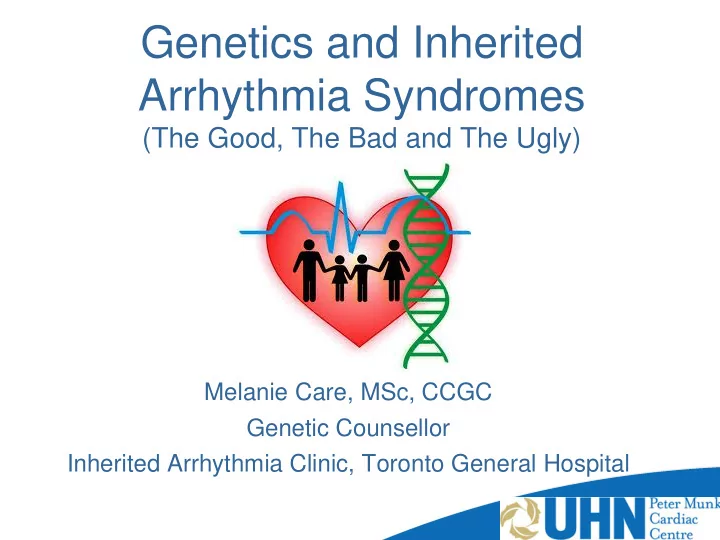

Genetics and Inherited Arrhythmia Syndromes (The Good, The Bad and The Ugly) Melanie Care, MSc, CCGC Genetic Counsellor Inherited Arrhythmia Clinic, Toronto General Hospital
• No COI to disclose
Objectives • To review basic inheritance in hereditary arrhythmias • To discuss interpretation of genetic test results • To demonstrate utility and limitations of genetic testing
Inherited Arrhythmias Autosomal dominant Reduced Penetrance Variable Expression A = disease-causing variant a = normal copy
Genetic Testing • Rapid, high-throughput DNA analysis • Simultaneous testing of large numbers of gene
The Good…. • 21 yo with recurrent syncope • Resting ECG shows borderline QT • Exercise test shows abnormal QT dynamics s/o LQTS
+ - + + KCNQ1 , p. Gln356X LONG QT SYNDROME • Confirmation of diagnosis • Management recommendations • Accurate family risk assessment • Cascade screening
The Bad... • 18 yo sudden death, autopsy consistent with ARVC • Parents, siblings referred for clinical evaluations • 20 yo brother has features s/o ARVC
Genetic testing - negative No mutations/variants detected OR Gene variants detected known not to cause disease
• Clinical diagnosis not excluded – If clinical suspicion is high, negative results must be interpreted with caution • Hereditary condition not ruled out • At-risk family members require comprehensive evaluation and f/u Care et al, Curr Cardiol Rep, 2017
The Ugly… • 49 y.o. man presents at local ER with fever • ECG shows Brugada pattern • Additional investigations equivocal
**Not all gene variants cause disease**
Variants of Uncertain Significance • Diagnosis not confirmed/eliminated • Genetic cause not confirmed/eliminated • Genetic testing not useful for unaffected family members
Does this gene cause disease? • How was the gene discovered? • Is there good evidence to support gene- disease association
Brugada syndrome - Genetic testing panels # Genes on Testing Panel Laboratory **The presence of a gene on a genetic testing panel does not equal association with disease**
KCNJ8 SCN5A CACNA1C SCN10A Brugada syndrome HCN4 CACNB2 ABCC9 GDP1L KCNH2 PKP2 KCND3
Does this variant cause disease? Rare gene variants are present in the general population!
RYR2 rare variants identified in 9% of individuals referred for whole exome sequencing (all indications)
Does this result make sense? • Genetic results must be interpreted in the context of clinical presentation
Why It Matters Normal echo No clinical screening ACTN2 No clinical screening No clinical screening p.Gly7Ser VUS Medical Advice Given: • Genetic testing for mother • IF result positive, genetics on other children and f/u for those who test positive • IF result negative, other children not at risk and no further f/u or testing required
Why It Matters KCNH2 ACTN2 p.Trp1001X p.Gly7Ser Pathogenic VUS KCNH2 p.Trp1001X Pathogenic LQTS • Mother – negative for ACTN2, positive for KCNH2 • Half-siblings AT RISK, clinical evaluations and genetic testing recommended
Conclusion • Genetic testing can be a useful and powerful tool in confirming diagnoses, managing risk in affected patients, identifying at-risk family members • Genetic testing is one piece of the puzzle • Genetic testing should be undertaken in the context of expert, clinical evaluation and appropriate genetic counselling
Thank you! melanie.care@uhn.ca
Recommend
More recommend